TODAY’S READING FROM THE OLD TESTAMENT- JEREMIAH 12:1-14:10.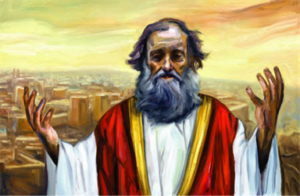
Jeremiah’s faith has been sustained through his ministry challenges so far. But from Chapter 11:18, when Jeremiah is shown by the Lord that the men of Anathoth were plotting to kill him, he begins to question God, doubt the worthiness of his mission, and is tempted to quit.
He asks questions we have heard before: Why do the heathen prosper? Why do all the faithless live at ease while my life is full of trouble?
Jeremiah 12:1 1 Righteous are You, O LORD, that I would plead my case with You; Indeed I would discuss matters of justice with You: Why has the way of the wicked prospered? Why are all those who deal in treachery at ease?
The Lord answers Jeremiah with these revealing words:
Jeremiah 12:5 5 “If you have run with footmen and they have tired you out, then how can you compete with horses? If you fall down in a land of peace, how will you do in the thicket of the Jordan?
There are at least two meanings found in this reply. First, Jeremiah, who is feeling the strain of persecution and death threats, is being trained and strengthened for future trials that will be even more severe. Like a weightlifter in training, he is feeling the strain of the barbells that he has been given. He is building muscle with the weight resistance of his current load in order to be strong enough for the trials to come. No pain, no gain. The hard times make you strong. The Lord is indicating that He is sovereign and good. He has matters well in hand. He has a set course for Jeremiah in which he can learn of Christ’s future sufferings and also be conformed to His character.
Secondly, this statement reminds us that the Lord knows how much we can handle. He doesn’t throw us into a race with the horses until He knows that we can keep up with the footmen.
The Apostles Paul and Peter teach us to endure hardship (2 Tim 2:3; 4:5) and dignify our trials with a heart of thanksgiving, an attentiveness to God’s grace, and an eagerness to learn whatever lesson we can from our engagement with difficulties (1 Peter 2:6).
The Lord was grooming Jeremiah in a relatively safe contest, though Jeremiah thought being the subject of an assassination plot was hardly safe! God had plans to platform His grace in a greater way in the future by bringing Jeremiah into greater hardships, which would be more like ‘the thickets by the Jordan’ than the ‘land of peace’ of Jeremiah’s present circumstances.
Jeremiah is learning not to put his trust in other men, even his own family (12:6).
Jeremiah 12:6 6 “For even your brothers and the household of your father, even they have dealt treacherously with you, even they have cried aloud after you. Do not believe them, although they may say nice things to you.”
The shepherds of Israel were no longer acting in the interest of the sheep (12:10).
Jeremiah 12:10 10 “Many shepherds have ruined My vineyard; they have trampled down My field; They have made My pleasant field a desolate wilderness.”
There is a recurring post-script to Jeremiah’s pronouncements of inevitable judgment.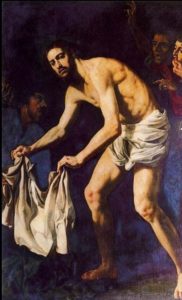
Jeremiah 12:15 15 “And it will come about that after I have uprooted them, I will again have compassion on them; and I will bring them back, each one to his inheritance and each one to his land.”
In Chapter 13, Jeremiah is commanded to perform another mini drama. He is commanded by the Lord to purchase a linen belt and personally wear it wrapped around his waist. Then he was to take it off his person and hide it in a crevice in the rocks at Perath. Many days later he was asked by the Lord to go to Perath and retrieve the linen from the rocks where it was hidden. It was ruined.
Jeremiah 13:8-11 8 Then the word of the LORD came to me, saying, 9 “Thus says the LORD, ‘Just so will I destroy the pride of Judah and the great pride of Jerusalem. 10 This wicked people, who refuse to listen to My words, who walk in the stubbornness of their hearts and have gone after other gods to serve them and to bow down to them, let them be just like this waistband which is totally worthless. 11 For as the waistband clings to the waist of a man, so I made the whole household of Israel and the whole household of Judah cling to Me,’ declares the LORD, ‘that they might be for Me a people, for renown, for praise and for glory; but they did not listen.”
Jeremiah then quotes a proverb that would have been familiar to his hearers, “Every wineskin should be filled with wine,” signifying the promise of prosperity, like our American baby boomer proverb, “A chicken in every pot and a car in every garage.”
But instead of reaping the benefits of the promise, they are reaping the worst-case scenarios. Instead of the satisfaction of good wine, they will reap the havoc and destruction of drunkenness. It would be like saying, “Instead of a chicken in the pot to satisfy your hunger, you will be getting salmonella poisoning to make you sick. Instead of a car in your garage so you can travel, you will suffer the calamity of a car crash or carbon monoxide poisoning that will kill you.” He includes the kings, the priests, and the prophets in his prediction of Jerusalem’s destruction.
Jeremiah is filled with holy boldness. He had to be bold. God told him to say this to King Jehoiachin and the Queen mother, Nehushta, “Take a lowly seat, for your beautiful crown has come down from your head” (13:18).
When they ask themselves why this is happening to us, they are told it is because of their sin and their proud unrepentant hearts:
Jeremiah 13:23 23 “Can the Ethiopian change his skin or the leopard his spots? Then you also can do good who are accustomed to doing evil.”
In Chapter 14 Jeremiah predicts a drought. Although Jeremiah prays penitently (Jer 14:7-9), the Lord says that His people have passed the point of receiving mercy and now must face their judgment (Jer 14:10).
TODAY’S READING FROM THE NEW TESTAMENT – 1 THESSALONIANS 1:1-2:9
It is believed that Paul’s letter to the Thessalonians is the earliest written apostolic epistle in the New Testament. Paul brought the gospel to Europe on his second missionary journey (49-50 AD). He had a vision while in Asia Minor (Troas) to go to Macedonia. After being imprisoned and beaten in Philippi, he went to Thessalonica, probably in the early summer of 50 AD (Acts 17:1-9). He preached that Jesus is the Christ in the synagogue for three Sabbaths. Some believed, but others stirred up a mob to persecute Paul’s host, Jason, and charged Paul and Silas with insurrection, that they served another King, one Jesus. So, they sent Paul and his companions away to Berea. But the church they left behind in Thessalonica thrived amid controversy and opposition.
Paul sent Timothy from Athens to Thessalonica to learn how the believers in Thessalonica were maturing as a body of believers. He returned with a glowing report of their growth as disciples and with their doctrinal questions about the second coming of Christ. He also encourages them to pursue personal holiness.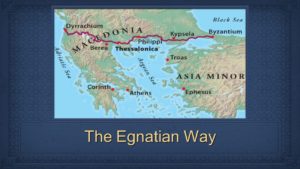
Thessalonica was an important port city on the north-western corner of the Aegean Sea. It was the capital city, and the largest in Macedonia. It attracted business from far and wide not only because of its harbor, but because it was situated on the Egnatian Way, the military highway joining Rome to the East. As with Corinth, evil and licentious living flourished, fueled by its heathenism and idol worship.
Paul writes to commend them for ‘turning from idols to serve the living and true God.’ (1 Thess 1:9). He also commends them for recognizing the hope of the gospel, that the crucified, risen and ascended Jesus Christ is coming again and will rescue His people from the promised wrathful judgment awaiting the unrepentant.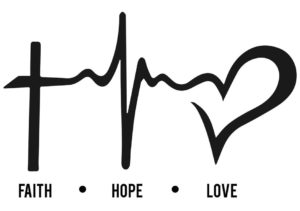
Like a good doctor, Paul checks the church for vital signs: LOVE motivating their labor, FAITH inspiring their work, and their endurance inspired by their HOPE in the Lord Jesus Christ. This assures Paul that they were chosen- the gospel had taken root not just in their heads, not just in lip service, but that the Holy Spirit had changed their lives and given them a deep conviction of Christ’s finished work of redemption and His supremacy over all things. Their God is real. Their love and their faith were real.
Paul reminds them that, although his visit to their city resulted in persecution and his personal expulsion, the mission was not a failure. The persecution only proved the genuineness of Paul’s loyalty to the gospel truth. Their endurance proved the genuineness of their hope in Christ. Their fruitfulness in the midst of hardship proved the reality of their conversion.
Paul’s ministry is described in the tender terms of a spiritual parent. This is a great example for moms and dads as they minister to their children and an example for those in the process of making disciples: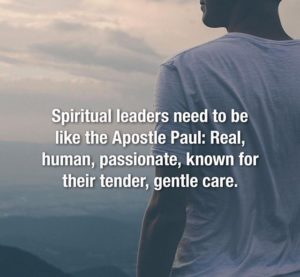
1 Thessalonians 2:7-9 7 But we proved to be gentle among you, as a nursing mother tenderly cares for her own children. 8 Having so fond an affection for you, we were well-pleased to impart to you not only the gospel of God but also our own lives, because you had become very dear to us. 9 For you recall, brethren, our labor and hardship, how working night and day so as not to be a burden to any of you, we proclaimed to you the gospel of God.
TODAY’S READING FROM THE BOOK OF PSALMS – PSALMS 79:1-13
This Psalm is written in the aftermath of Jerusalem’s destruction and the temple’s defiling by the Babylonian invasion. Despite these desperate circumstances, the Lord is still seen by the Psalmist as Israel’s King. Though despised and rejected, though His commandments were disobeyed, and the people turned to other gods, the Lord remained true to Who He is, as the Keeper of His Promises.
The Psalmist cries for a turnaround:
Psalm 79:9 9 Help us, O God of our salvation, for the glory of Your name; And deliver us and forgive our sins for Your name’s sake.
Psalm 79:13 13 So we Your people and the sheep of Your pasture Will give thanks to You forever; To all generations we will tell of Your praise.
TODAY’S READING FROM THE BOOK OF PROVERBS – PROVERBS 24:30-34
Proverbs 24:30-34 30 I passed by the field of the sluggard and by the vineyard of the man lacking sense, 31 And behold, it was completely overgrown with thistles; Its surface was covered with nettles, and its stone wall was broken down. 32 When I saw, I reflected upon it; I looked, and received instruction. 33 “A little sleep, a little slumber, A little folding of the hands to rest,” 34 Then your poverty will come as a robber and your want like an armed man.
How easily we opt for comfort. How quickly to go the way of the least resistance. The ruined field of the sluggard is filled with excuses. “This work is too hard.” “Someone else will do it.” “Someday I’ll get around to it.” Soon poverty comes like a robber, leaving you in want. Learn from the field of the sluggard and compare it to the field of the diligent.
PRAY FOR THE NATIONS – QATAR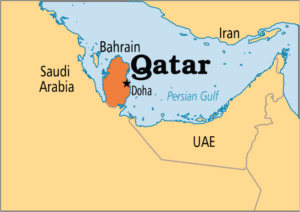
Qatar
State of Qatar
Asia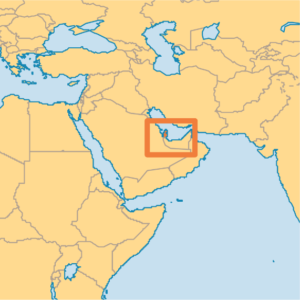
Geography
Area: 11,400 sq km
Arabian peninsular state that is almost entirely desert.
Population: 1,508,322 Annual Growth: 11.24%
Capital: Doha
Urbanites: 95.8%
HDI Rank: 33 of 182 (UN Human Development Reports 2009)
Peoples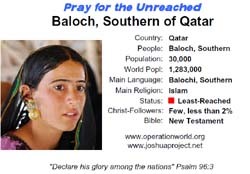
Peoples: 23 (30% unreached) All peoples
Unreached Peoples Prayer Card
Official language: Arabic Languages: 6
Religion
Largest Religion: Muslim
|
Religion |
|
Pop % |
Ann Gr |
|
89,142 |
5.91 |
2.2 |
|
|
14,552 |
1.0 |
3.3 |
|
|
Muslim |
1,333,206 |
88.39 |
|
Challenges for Prayer
Expatriates are drawn from many nations by the high earnings in Qatar, but Christians are limited by strict anti-proselytism laws. Pray for the employment opportunities (from manual labor up to executive positions) to be filled by Christians who would be an intentional Kingdom presence in Qatar.
PRAYER: O Lord, we know that if we lean on our own understanding, our own strength and our own wisdom we will forever come up short. Thank You for Your remedy. You have given all that we need in Christ. You have united us with Him- Your perfect solution. And He has become for us our righteousness, sanctification, and redemption. The condition of our hearts was unsalvageable. Thank You for Christ’s work on the cross, which executed the sentence of death upon our heart of stone and given us a new heart that is alive and responsive to You by the power of the Holy Spirit. We ask that You empower us to serve Your purposes as You build Your church. Give us parental affections for Your children whom we serve. In Jesus’ Name. Amen.
